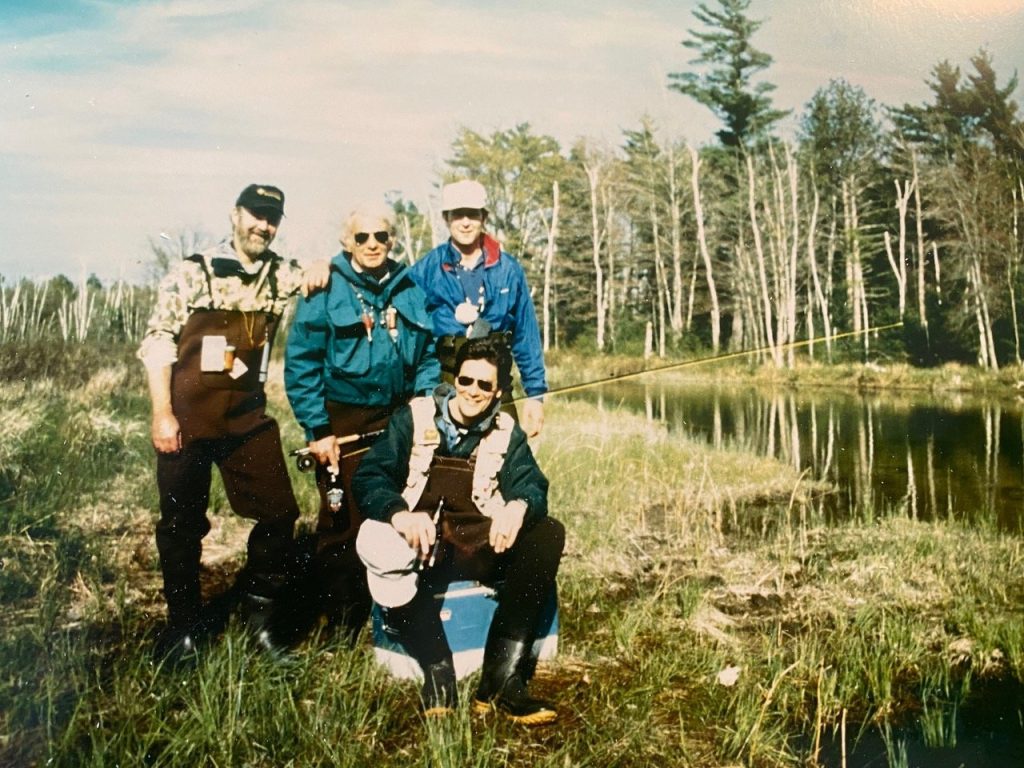“In the Company of Fishermen”
from A Little More About Me by Pam Houston
Republished with permission from the author, Pam Houston. This essay was originally published in Elle Magazine in 1999.

I can’t remember the last time I envied a man, or, in fact, if I ever have. I have loved men, hated them, befriended them, taken care of them, and all too often compromised my sense of self for them, but I don’t think I have ever looked at a man and actually coveted something his maleness gave him. And yet envy was at least one of the surprising things I felt last spring when I found myself standing armpit-deep in a freshwater stream at 2:00 a.m., near Interlochen, Michigan, fly-casting for steelhead with a bunch of male poets.
Winters are long in northern Michigan, and dark and frozen. Spring is late and wet and full of spirit-breaking storms. The landscape is primarily forest and water and has not been tamed like most of the Midwest. Both the wildness and the hardship show on the faces of the people who choose to live there.
When a man named Jack Driscoll first calls and invites me to Interlochen, he tells me about the Academy, a place where talented high school students from forty-one states and fifteen countries are given a lot of time to develop their art. Although he makes it clear that I will be expected to read from my fiction and talk to the students about craft, every other time we speak on the phone, all he really wants to talk about is fishing.
For all the time I spend outdoors, I am not much of a fisherman. And fly-fishing, like all religions, is something I respect but don’t particularly understand. If Jack bothers to ask me if I want to go fishing, I will say yes. I have always said yes, and as a result the shape of my life has been a long series of man-inspired adventures, and I have gone tripping along behind those men, full of strength and will and only a half-baked kind of competence, my goal being not to excel, but to simply keep up with them, to not become a problem, to be a good sport. It is a childhood thing (I was my father’s only son), and I laugh at all the places this particular insecurity has taken me: sheep hunting in Alaska, helicopter skiing in Montana, cliff diving in the Bahamas, ice climbing in the Yukon territory. Mostly I have outgrown the need to impress men in this fashion; in the adventures I take these days, I make the rules. But, as my trip to Michigan draws nearer, I feel a familiar and demented excitement to be back at the mercy of a bunch of lunatic outdoorsmen, a stubborn novice with something older than time to prove.
I fly up to Traverse City on what the woman at the United Express counter calls the “big” plane, a twin-engine that bumps between thunderstorms and patches of dense fog for an hour before skidding to a stop on a bleak and rainy runway surrounded by leafless April woods.
I am greeted by what looks like a small committee of fit and weathered middle-aged men. Their names are Jack Driscoll, Mike Delp, Nick Bozanic, and Doug Stanton. Their books are title after the landscape that dominates their lives, collections of poetry called Under the Influence of Water, The Long Drive Home, and Over the Graves of Horses, and Jack’s award- winning collection of stories, Wanting Only to Be Heard. They fight over my luggage, hand me snacks and sodas and beers, and all but carry me to the car on the wave of their enthusiasm.
“Weather’s been good,” Mike says, by way of a greeting. “The lake ice is breaking.”
“It’s a real late run for the steelhead,” Doug says. “You’re just in time.”
“Any minute now, any minute now,” Jack says, his mind full of the long dark bodies of fish in the river, and then, “You’ve got a reading in forty-five minutes, then a dinner that should be over by ten. The president of the local community college wants to meet you. At midnight, we fish.”
By 12:25 a.m. I am dressed in my long underwear, Jack’s camouflage sweat clothes, Mike’s neoprene liners, Doug’s waders, and Nick’s hat. I look like the Michelin tire man, the waders so big and stiff I can barely put one foot in front of the other. We pile into Mike’s Montero, rods and reels jangling in the back. Jack and Mike and Doug and I. Nick, each man has told me (privately, in a quiet, apprehensive voice), is recovering from bursitis and a divorce, and for one or another of those reasons, he will not fish this year.
No one asks me if I’m tired, nor do I ask them. These men have had nine months of winter to catch up on their sleep, cabin fever reflecting in their eyes like exclamations. The steelhead will start running soon, maybe tonight, and there is no question about where they should be.
It takes almost an hour to get to the river with what I quickly understand is an obligatory stop at the Sunoco in the tiny town of Honor for day-old doughnuts and Coca-Cola and banter with the cashier. Along the way we listen to what Mike and Jack say is their latest road trip tape, three Greg Brown songs recorded over and over to fill a ninety-minute drive. “Gonna meet you after midnight,” say the lyrics repeatedly, “at the Dream Café.”
The rotating sign on the Honor State Bank says 1:51 a.m. and twenty-two degrees. The men have bet on what the temperature will be. They have also bet on how many cars we will pass on the two-lane highway, how many deer we will see in the woods between Mike’s house and the bridge, if it will snow or rain, and, if so, how hard (hardness gauged by comparison with other nights’ fishing). Doug wins the temperature bet, closest without going over, at twenty-one degrees.
The betting is all part of a long conversational rap among them, a rap that moves from Mike’s last fish to Jack’s last fiction to concern for Nick and his lost house to the girl at the Sunoco to an in-unison sing-along to their favorite Greg Brown lyrics. The whole conversation is less like speaking really and more like singing, a song they’ve spent years and years of these cold spring nights together learning, nights anybody anywhere else in the world would call winter, nights filled with expectations that can only be called boyish and shadowed by too much of the grown-up knowledge that can ultimately defeat men.
Sometimes they remember I am there; sometimes they forget I am a woman.
I feel, in those moments, like I’ve gone undercover, like I’ve been granted security clearance to a rare and private work of art. And though I have always believed that women bond faster, tighter, deeper than men could ever dream of, there is something simple and pure between these men, a connection so thick and dense and timeless that I am fascinated, and jealous, and humbled, all at the same time.
“Shit,” Jack says. “Look at ‘em all.” We have come finally out of the woods and to a bridge no longer than the width of the two-lane roadway. As impossible as it is for me to believe, at 2:00 a.m. the gravel areas on both sides of the bridge are lined with pickups, a counterculture of night stalkers, two and three trucks deep.
I can see by the posture of the men who line the bridge and look gloomily over the edge that they do not teach poetry at Interlochen Arts Academy. One of them staggers toward the truck, reeling drunk. A boy of nine or ten, dressed in all camouflage, tries to steady him from behind.
“They ain’t here yet,” the old man says, an edge in his voice like desperation. “It may be they just ain’t coming.”
“They’ll be here,” Jack says, easing himself out of the Montero and steering the man away from the broken piece of bridge railing. “It’s been a long winter for everybody,” Jack says, almost cooing, and the old man drunkenly, solemnly nods.
Mike pulls me out of the truck and hands me a flashlight. We creep to the edge of the bridge and peer over. “Just on for a second and off,” he whispers. Even to me it is unmistakable; the flashlight illuminates a long, dark shape already half under the pylon. “Don’t say anything,” Mike mouths to me soundlessly. Jack leaves the old-timer to sleep in his car and joins us. Mike holds up one finger and Jack nods. “We’ll go downstream,” Jack says after some consideration. “Nobody’s gonna do any good here.”
We drive downriver while Mike points out all the sights as if we can see them—a place called the Toilet Hole, where Doug and Nick got lucky, the place Mike got his car stuck so bad four-wheel drive couldn’t help him, the place Jack caught last year’s biggest fish. We can see the headlights of people who are smelt-dipping out where the river empties into the lake, and a red-and-white channel marker lit up and looming in the darkness, its base still caked with lake ice and snow.
We drop Doug off at his favorite hole near the mouth of the river, drive back upstream a few hundred yards, park the Montero, and step out into the night.
“It’s a little bit of a walk from here,” Mike says, “and the mud’s pretty deep.” It’s impossible for me to imagine how I will move my stiff and padded legs through deep mud, how at twenty-two degrees, I will step into that swift and icy river, much less stand in it for a couple of hours. I can’t imagine how, with all these clothes and pitch dark around me, I’ll be able to cast my fly with anything resembling grace.
Two steps away from the truck and already I feel the suction. The mud we are walking in ranges from mid-calf to mid-thigh deep. I’m following Jack like a puppy, trying to walk where he walks, step where he steps. I get warm with the effort, and a little careless, and suddenly there’s nothing beneath me and I’m in watery mud up to my waist. Mike and Jack, each on one arm, pull me out fast it seems like part of the choreography.
“Let’s try to cross the river,” says Jack, and before I can even brace for the cold, we are in it, thigh…hip…waist deep, and I feel the rush of the current tug me toward Lake Michigan. “One foot in front of the other,” Jack says. “The hole’s right in front of you; when you’re ready, go ahead and cast.
I lift the rod uneasily into the night, close my eyes and try to remember how they did it in A River Runs Through It, and then bring it down too fast and too hard with an ungraceful splat. “Let out a little more line,” Jack says, so gently it’s like he’s talking to himself. A few more splats, a little more line, and I am making casts that aren’t embarrassing. Jack moves without speaking to help Mike with a snarl in his line. “This is your night, Delp,” Jack says, his shadowy form floating away from me, a dark and legless ghost.
What in the world are you doing here? a voice giggles up from inside me, and the answers sweep past me, too fast to catch: because I can’t turn down a challenge, because my father wanted a boy, because touching this wildness is the best way I know to undermine sadness, because of the thin shimmery line I am seeing between the dark river and the even darker sky.
Soon I stop thinking about being washed to Lake Michigan. I marvel at how warm I am in the waders, so warm and buoyant that I forget myself from time to time and dip some unprotected part of me, my hand or elbow, into the icy water. A deer crackles sticks in the forest across the river; an angry beaver slaps his tail. In whispers we take turns identifying Ursa Major, Draco, Cassiopeia, Mars, and Jupiter and murmur at the infrequent but lovely falling stars.
When we are quiet I can hear a faint crashing—constant, reverberant—sounding in the dark for all the world like the heartbeat of the earth. “Lake Michigan coming over the breakwater,” Jack says to my unasked question. “There must be a big wind on the other side.”
My fishing is steadily improving: every fifth or seventh cast hangs a long time in the air and falls lightly, almost without sound.
“You know,” Jack says, “there aren’t too many people who could come out here like this and not hook themselves or me or the shoreline…isn’t that right, Delp?” Mike murmurs in agreement, and my head swells with ridiculously disproportionate pride.
The constellations disappear, and a light snow begins falling. “God, I love this weather,” Mike says, his voice a mixture of sarcasm and sincerity, and for a while there is only the whisper of the line and the flies.
“Fish!” Jack shouts suddenly. “Fish on the line!” I am startled almost out of my footing, as if I’ve forgotten what we’ve come here for, as if the silence of the night and the rhythm of the flies hitting the water have become reason enough. We reel in our lines and watch Jack land his fish. It is long and thin and its speckled belly gleams silver as it thrashes in the tiny beam of the flashlight. Jack looks at us helplessly, delighted by his luck and yet wishing, simultaneously, that it had been me who caught the fish, wishing even harder, I can see, that it had been Mike.
We fish a little longer, but now there’s no need to stay. The spell has been broken; the first steelhead has been caught in its journey up the Platte.
“Let’s wade downriver a little,” Jack says, when we’ve reeled in our lines, “to try to avoid the mud.” I take short rapid breaths as we move through the water. “This part is deep,” Jack says. “Take it slow.”
The water creeps up my chest and into my armpits; I’m walking, weightless, through a dark and watery dream. For a moment there is nothing but my forward momentum and the lift of water under the soles of my boots that keep me from going under. Then I feel the bank rise suddenly beneath my feet.
“No problem,” I say, just before my foot slips and I do go under, head and all, into the icy current. I thrash my arms toward shore, and Jack grabs me. “Better get you home,” he says, as the cold I’ve ignored for hours moves through my body with logarithmic speed. “You’ve gotta meet students in a couple of hours.” Back at the truck Doug is curled under a blanket like a dog.
The next day Jack sleeps while Mike makes sure I meet my classes. The students are bright, skeptical, interested. My head buzzes with the heat of the all-nighter, a darkness, like the river dark, threatening to close in. Mike and I drink bad machine coffee in one of the tunnels that connect the English department to the other school buildings, tunnels to keep the students from getting lost in the storms that bring the blowing snow.
“It’s hard to explain how much I love these guys,” Mike says suddenly, as if I’ve asked him. “I don’t know what I’d do without what we have.”
The cement walls of this poor excuse for a lounge move in on us like the weather, and this poet who more resembles a wrestler looks for a moment as if he might cry.
It is late in the evening. I have met three classes, talked to at least thirty students, given another reading, signed books in Traverse City, and as part of an orgy of a potluck, cooked elk steaks, rare, on the grill. Mike, in his other favorite role of DJ, plays one moody song after another on the stereo: John Prine, John Gorka, and early Bonnie Raitt. We are all a little high from the good food and tequila. Mike’s ten-year-old daughter Jamie and Jack dance cheek to cheek in their socks on the living-room floor.
“So are we gonna do it?” Jack says when the song ends, a sparkle in his eye that says the river is always in him, whether he’s standing in it or not. This fish-and-fiction marathon is in its thirty-eighth hour, and I have moved beyond tired now to some new level of consciousness.
I have spent too much of my life proving I can be one of the guys, never saying uncle, never admitting I’m tired, or hurting, or cold. Tonight I am all three, but the thing that makes me nod my head and say yes I want to go back again and stand in that icy river has nothing, for a change, to do with my father, or my childhood, or all the things in the world I need to prove. It is the potent and honest feeling between these men that I covet, that I can’t miss an opportunity to be close to. I have stumbled, somehow, onto this rare pack of animals who know I am there and have decided, anyway, to let me watch them at their dance. I want to memorize their movements. I want to take these river nights home with me for the times when the darkness is even heavier than it is in this Michigan sky.
A flurry of rubber and neoprene, and we’re back inside the Montero. Greg Brown is singing the song about the laughing river. “This is your night, Delp,” Jack says. “I can feel it.” Around the next bend will be Honor’s scattered lights.






